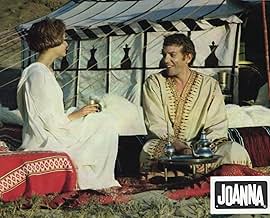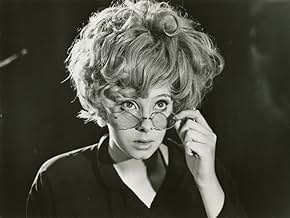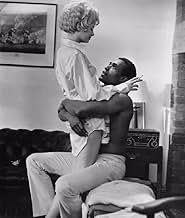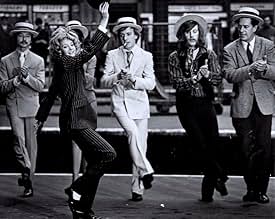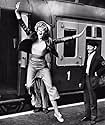Une fille de province est empêtrée dans la morale moderne de Londres.Une fille de province est empêtrée dans la morale moderne de Londres.Une fille de province est empêtrée dans la morale moderne de Londres.
- Réalisation
- Scénario
- Casting principal
- Récompenses
- 1 nomination au total
Avis à la une
It is silly the way we talk about movies. They are not meant for the ages but for slices of time. Once in a great great while one captures something eternal...8 1/2, Third Man, etcetera, but films are social chewing gum. Here is a fine example of an English director of the 1960s doing some turns that were fresh seeming and of the time...playing to the camera in the post dramatic sequence...don't tell me that wasn't and still would be a kick. And Sutherland's lisping soliloquy in the desert, my first awareness of the Canadian actor. A memorable film, one with some fans, many deprecators. But that's what makes horse races. Does sit hold up to critical analysis? Probably not, certainly not in the context of a lot that has followed. But lovely and fresh and exciting at the time, just like that first date with the sweet fresh girl who is now the woman with the scar from the auto accident. We change, the cinema changes. Films are not for the ages, after all, but acts of commerce sometimes tinged with art and freighted with our associations.
Mr. Sarne's portrait of an era, now seems often laughable and ludicrous, not unlike many other feature films that intended to demonstrate the importance of one single period, specially such a difficult one as the 60s - they just seem to loose their punch throughout the years. Although 'Joanna' does provide enjoyable, light moments, most of them are all too heavy handed, and unconnected. The movie relies on a number of senseless episodes to show us the story of a young woman yearning to find an adult identity in London, during the late 60s. What could be a sensible, lovely little story - if properly told - is wounded by Ms. Waite's inexperience, as she sleepwalks through the movie, and can only act appalled and shocked during the major conflicts of the story, Mr. Sarne's hideously pretentious, pompous direction, and Mr. Rod McKuen's tedious soundtrack, only highlighted at the movie's ending, in which the entire cast join in a train station singing the title tune - 'you fill our hearts with hope, your smile's like Cinemascope' - while Joanna departs to have her baby, still, as imature, childish and unprepared as she was in the beginning of the movie.
I saw it in 1968 in a theater in Willamette, Illinois and remember little of it now except for a dance line at the railway station and a sojourn in the desert. The reviewer ahead of me is probably right. Probably not a great movie but for some reason it struck me right at the time. I have been trying to find out anything about the film ever since. Only today did I find it here. I am happy to know it is not wholly forgotten. If anyone knows of a copy I would be very happy to see it
Director Michael Sarne would have the filmgoing public believe that the studios, the actors (in MYRA BRECKINRIDGE in particular), and 'the system' torpedoed his career. But, when one sees his single picture of note, JOANNA, on the big screen in a rare public showing - One discovers that the film world did not lose much. Composer Rod McKuen attended this weekend's American Cinemateque screening and revealed that the title character was a thinly autobiographical substitute for the director himself (Joanna's surname is 'Sarne' after all).
On paper, it would seem to make an exciting story - Young and handsome teen comes to London; Dresses in chic fashions; Hangs out with the 'in' crowd; Has sex with every other person one meets; Parties every night; Travels to exotic lands etc. How odd then that so much of the film wanders around aimlessly from venue to venue, from person to person, from incident to incident with so little meaning or consequence. It's rare that someone would find his own life so aimless. That aimlessness is certainly a part of what Sarne was after, but almost certainly not to the degree portrayed here.
To be fair, there are flashes of genuine artistic talent (and some can be mined from MYRA BRECKINRIDGE as well). The opening and closing title sequences are terrific, playful and inspired. Color, sound and editing are experimentmented with in interesting ways. A long sojourn to Morocco is both colorful and meaningful. The middle of the picture is indeed dominated by Donald Sutherland as a rich dude who takes Joanna and some friends to Africa. Affecting a bizarre stuttering accent, one can't help but be entertained, even if one suspects that much of the reaction of modern audiences is the result of familiarity with Sutherland more than the skill of the performance (indeed McKuen insisted that Sutherland's accent came and went so frequently that much of his performance had to be edited around and drowned in his music!).
Certainly an interesting document of its time (with the 'shocking' inclusion of not one but two interracial romances, free sex, and the intrusion of unnecessary violence into young people's lives - a nod to Vietnam?), JOANNA is a fascinating failure.
On paper, it would seem to make an exciting story - Young and handsome teen comes to London; Dresses in chic fashions; Hangs out with the 'in' crowd; Has sex with every other person one meets; Parties every night; Travels to exotic lands etc. How odd then that so much of the film wanders around aimlessly from venue to venue, from person to person, from incident to incident with so little meaning or consequence. It's rare that someone would find his own life so aimless. That aimlessness is certainly a part of what Sarne was after, but almost certainly not to the degree portrayed here.
To be fair, there are flashes of genuine artistic talent (and some can be mined from MYRA BRECKINRIDGE as well). The opening and closing title sequences are terrific, playful and inspired. Color, sound and editing are experimentmented with in interesting ways. A long sojourn to Morocco is both colorful and meaningful. The middle of the picture is indeed dominated by Donald Sutherland as a rich dude who takes Joanna and some friends to Africa. Affecting a bizarre stuttering accent, one can't help but be entertained, even if one suspects that much of the reaction of modern audiences is the result of familiarity with Sutherland more than the skill of the performance (indeed McKuen insisted that Sutherland's accent came and went so frequently that much of his performance had to be edited around and drowned in his music!).
Certainly an interesting document of its time (with the 'shocking' inclusion of not one but two interracial romances, free sex, and the intrusion of unnecessary violence into young people's lives - a nod to Vietnam?), JOANNA is a fascinating failure.
Michael Sarne wrote and directed this odd, sometimes-charming, sometimes-not chronicle of a wide-eyed art student in '60s London who falls in with a decadent crowd. Helium-voiced Genevieve Waite is like a cross between Anne Heche and Shirley Temple. She has fantasies of bathing nude in a pond full of lilies and being dried off by her girlfriend dressed as a maid, and later one featuring the same friend being strangled by her lover. "Joanna" is incongruous: Sarne is in love with old-fashioned trappings and modern techniques. Some of his shots are delectable (Waite crossing a bridge at sunset, or running down a pathway lined with trees), but the film's eye-candy needs something substantial to go with it. As to Waite's Joanna, I never understood the leading character or felt anyone on-screen did either (at one point, the girlfriend says to Joanna, "I don't sleep around as much as you do", but we never get the impression that Joanna is promiscuous--she seems only to want true love). Donald Sutherland gives the film's only solid performance as a fey Lord and the sharp, canny editing keeps the picture popping. Otherwise, the movie is just a mod bauble, and only a hint of true cleverness is left behind. ** from ****
Le saviez-vous
- AnecdotesThis was the first feature film to be directed by Michael Sarne. It got mostly very bad reviews in Britain, where its release was delayed until 1969. Then, it was shown in the lower half of a double-bill with "Pretty Poison" to an indifferent box-office response. However, in America, where it had been screened earlier, it had a modest financial success, which led Twentieth Century Fox to make the catastrophic decision to entrust Sarne with the direction of "Myra Breckinridge", one of the biggest disasters (and most reviled films) in the studio's history. Gore Vidal, the original author of "Myra Breckinridge", had seen "Joanna" and called it one of the worst films ever made, making it unlikely that any film made from his novel by the same director would be anything but terrible.
- GaffesWhen Joanna, Lord Sanderson, Beryl, and party go to Morocco (North Africa) for vacation. Joanna gives Sanderson a gift which he calls a compass, but it's actually a sextant, a more complex navigating instrument.
- Crédits fousPanavision is the first thing to be credited. The production seal follows. Then, "This film is entirely fictional..." appears on the screen. Director Michael Sarne is then credited, followed by the rest of the crew members. The actors are not credited. The title of the film appears last and blinks on and off in neon, soft-focus letters.
- ConnexionsReferenced in Pentagon Papers (2017)
- Bandes originalesJoanna
Music and Lyrics by Rod McKuen
Sung by Chorus
Published by Twentieth Century Music Corporation-ASCAP
Meilleurs choix
Connectez-vous pour évaluer et suivre la liste de favoris afin de recevoir des recommandations personnalisées
- How long is Joanna?Alimenté par Alexa
Détails
- Durée1 heure 48 minutes
- Couleur
- Rapport de forme
- 2.35 : 1
Contribuer à cette page
Suggérer une modification ou ajouter du contenu manquant


